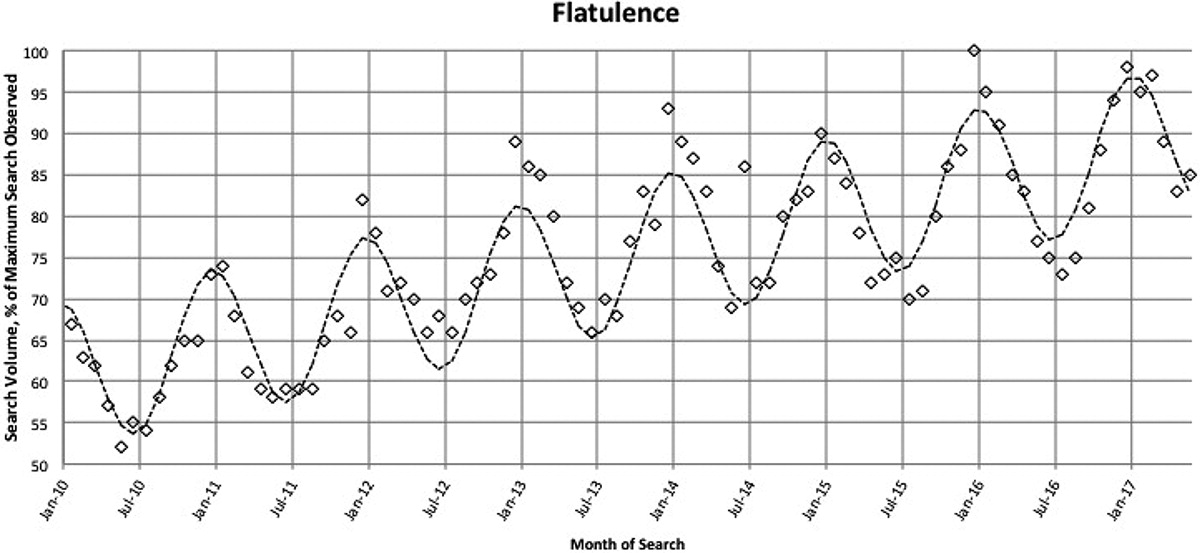Feeling a bit off? Chances are you turned to Google – we’ve all done it – and then scheduled an appointment with your doctor to discuss a list of rare incurable illnesses you might have. While some doctors might prefer not to compete with Google’s diagnosis, a group of physicians from the University of Alberta are embracing our need to Google things.
By analyzing Google search data from people concerned about their body odour, the research team, led by Dr. Tina Kronownyk, revealed there might be seasonal cycling in the bacteria that colonize our bodies. The research was published last month in the journal Chronobiology International.
Many illnesses are seasonal, like the uptick of flu in the winter or summertime allergies. Kronownyk and her colleagues started to wonder if the bacteria that colonize, or infect, our bodies have similar seasonality.
“We had seen some research talking about the fact that soft tissue infections were more common in the summer or early fall, and that’s what got us talking about the idea,” explains Kronownyk. “The assumption is that viruses are seasonal because we have [seasonal] influenza; what if some of the bacteria that we live with everyday are actually seasonal, too?”
To answer this question, Kronownyk and her colleagues needed an indicator, or readout, of bacterial activity in the general population. “That’s what got us on the topic of looking at odours,” says Kronownyk, explaining that human body odour is usually the result of resident bacteria on our bodies.
Instead of asking their patients about changes in their body odour, Kronownyk turned to Google Trends, a service provided by Google that tells users how often a particular term or set of terms is searched for over time. The researchers looked at the trends in search terms related to four body odours: bad breath, smelly feet, stinky armpits, and flatulence.
“We largely dislike when we hear someone say they Googled something,” says Kronownyk, but she explains that since so many people are Googling their symptoms, it can be a powerful tool for quickly investigating the validity of scientific questions.
“It’s primarily just because you can access a large amount of data in a relatively timely manner,” says Kronownyk. “Recognizing how many people use Google, it has the potential to contain a lot of information.”
So, are our body odours seasonal? Google Trends data suggests that they are.
Kronownyk and colleagues found that each of the four body odour searches peak and trough in accordance with the seasons. Flatulence, bad breath and foot odour – or at least people Googling these terms or terms related to them – reach a peak in January and February but are of little concern by the summer. Armpit odour, on the other hand, perhaps unsurprisingly, is searched for most during the summer months but rather infrequently during the winter. Kronownyk recognizes the change in search volume for armpit odour is likely the result of increased heat and sweating during the summer months, but is nevertheless intrigued by what the rest of the data suggests – a potential role for seasonality in the human microbiome.

While Kronownyk is optimistic about her results, she recognizes the limitations of her study design. Google Trends, after all, only tells you that people are searching for these topics, not what motivated them to search in the first place. Might the searches be the result of people being more self-conscious about their existing body odour with all the social events that cluster in the wintertime? While it’s difficult to rule out possibilities like this using the Google Trends data, Kronownyk does note that the seasonality seemed independent of major holidays.
“We don’t know for sure why people are searching these terms,” says Kronownyk. “But we’re assuming that most of them are hopefully searching because that’s something they – or their loved one – is struggling with.”
Kronownyk says the next step would be to follow up their Google Trends results with real patient data. So, don’t be surprised if your doctor seems preoccupied with your body odour on your next visit.








































